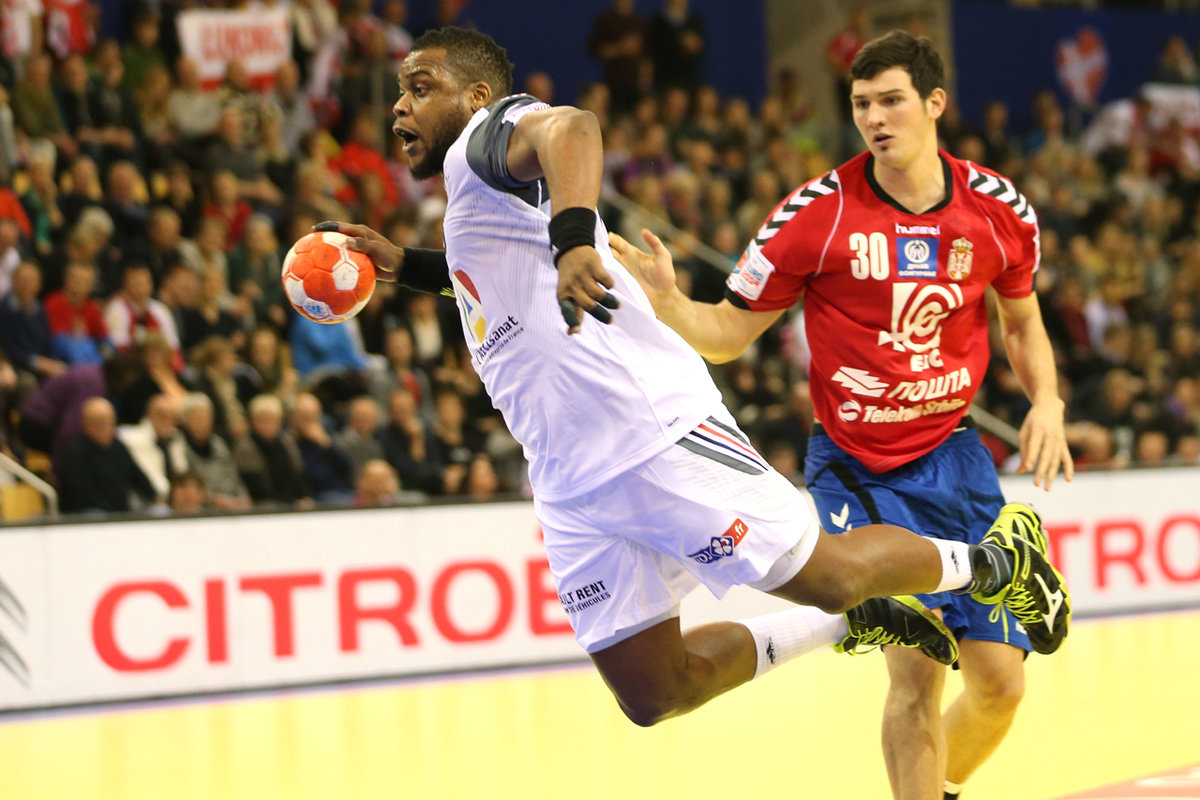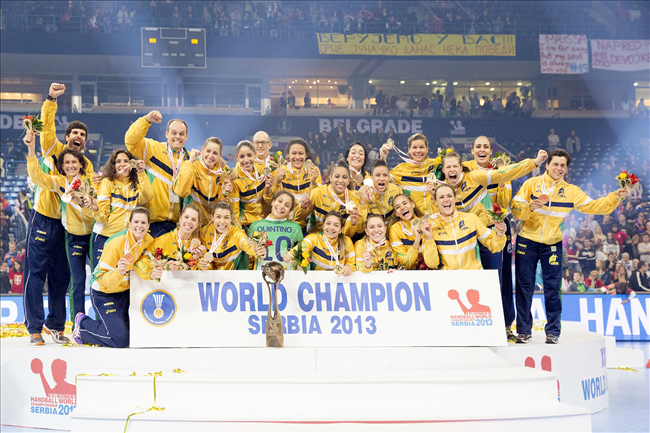
Qatari Referee Saleh Jamaan Bamurtef issues a yellow card warning against Croatia. Officiating was inconsistent to say the least in Qatar.
Former chair of the IHF Playing Rules and Referees (PRC) Commission, Christer Ahl, takes the IHF and Qatar to task for inconsistent officiating and unfair advantages for the host nation.
This should have been the exciting, biennial competition, where all the focus would be on the star players and the entertainment and excitement they are able to offer. There would be an expectation of fair play and evenhanded refereeing, in the spirit of ‘let the best team win!’ But this time, the IHF and the Qatari host conspired in various ways, so that the focus instead was on the mercenaries of what purported to be a Qatari national team, the many advantages they obtained, and the totally inconsistent refereeing which often was the deciding factor in key games.
Can everything be bought?
It all started in 2011, when to the surprise of many, the IHF Council decided to award the hosting of the 2015 event to Qatar. Especially against the background of the more publicized affairs around the awarding of the 2022 football World Cup to Qatar, there have also been many suspicions and accusations surrounding the IHF decision for handball. It is ironic that the country favored to be awarded this event in 2015 was precisely France, the opponents of Qatar in the final, who now had to deal with the extra burden of being up against the home team and all that this implies.
But the main topic for many observers was that Qatar had imported eleven players to fill all the key positions on their team, taking advantage of their own rules for awarding ‘half citizenship’ in Qatar, in combination with the very lenient rules of the IHF regarding changes in citizenship. (By contrast, FIFA has much stricter rules in football). We find it normal that wealthy club teams use their resources to acquire the best players in the world, but we have come to expect, until now, that national teams are genuine national teams.
Another aspect, unrelated to the Qatari team that instead became a problem for many other teams in important games, were the incredible nominations given to the incompetent Qatari referees. They were allowed to ruin several important games, and in one game the clearly affected the result, unfairly preventing Brazil from getting a sensational win against Croatia in the ‘round of 16’. It is difficult to imagine that the iHF Referee Chief was so oblivious to this problem, so one must assume that the instructions must have ‘come down from above’.
Referees under pressure
With their imported team, it was no surprise that Qatar advanced from the group stage to the elimination matches. And here it soon began to look as if the path towards a possible final was being paved for the home team. It was conspicuous that all the referee couples who have a reputation for being particularly capable of standing up to pressure were kept away from the games of Qatar in the ‘round of 16’, the quarterfinal and the semifinal. And in all cases, ‘less resistant’ referees were seen by neutral observers as having had a lot to do with the Qatari wins in very narrow games. In turn, Austria, Germany and Poland left the court fuming about mysterious decisions in critical moments, and also totally neutral observers found it to be a bit too much.
During my own time as the person ultimately responsible for the refereeing and the fair play on the court in IHF events, I am only too familiar with the situation. In 2007 in Germany, the IHF somehow seemed to ‘owe’ the gold medals to the host country, and many aspects were set up to favor the hosts. This included the situation in the quarterfinal and semifinal, where all tickets had been sold to German fans, and where IHF bosses even prevented me and my colleagues from taking warranted action against the home team. At least we tried to offset the pressure by assigning referees who were known to be courageous, but not even that helped. And in 2009, when the Croatian home team lost the final against France, I received threats for having assigned referees who were known to stay neutral and resistant. Here in Qatar, amazingly the situation was instead exacerbated through questionable nominations.
Irresponsible changes in rules interpretations and instructions
Many handball fans who follow European top level competition are likely to agree that the intentions of the 2010 rule book to clamp down on cynical and dangerous action have never really been realized. The IHF and the EHF have not been willing or able to insist on a closer adherence to the spirit of the rules, so the cynicism and dirty tricks have flourished. Therefore, I applaud the intentions of the IHF, as discussed and agreed in a conference of all stakeholders, including top coaches, a few months ago, to make a more concerted effort in the context of the next set of rules changes and instructions.
But, what the IHF president then suddenly decided, was totally crazy and irresponsible! The IHF Referee Commission and Coaching Commission were ordered to implement new, stricter interpretations with immediate effect in Qatar. Moreover, this was done without any forewarning to the team, who normally would be fully informed about major changes 6-12 months ahead of time in order to be able to adapt and prepare. Instead, they got a brief explanation the day before the event started….! No wonder that media around the world have been filled with shocked reports from the flood of punishments given out to unsuspecting players and teams, who cannot understand what has happened.
However, it seems that one specific team, namely Qatar, must have been extremely well informed about the new, stricter rules interpretation and completely ready to adjust to it, so that they actually deserved by far many fewer punishments than all the other teams. Because it is not very pleasant to think of other possible explanations as to why the referees, in game after game, found very few reasons to give 2-minute suspensions against Qatar…
The referees put in an impossible position
Clearly, a sudden adaptation to new standards would have been difficult for the referees even if the team had been prepared and ready to cooperate. But now the referees were caught between protesting teams and an awareness that if they did not follow instructions, they would risk being sent home after the group stage. Some referees handle this kind of adaptation and pressure better than others, but it is clear that inconsistencies are likely to arise both during matches and from one match to another. Some referees got carried away, taking too tough a line in a not very rough match, while others fell back into their habits of recent years.
What is worse is that uncertainties around a new interpretation always serve to increase the scope for biases and one-sided treatment of teams. In other worse, there are more ‘opportunities’ for referees to fall for the pressures that I discussed above, simply because the number of ‘marginal’ decisions will increase. Moreover, if the teams did not always manage, or want, to adapt to the new interpretations, it seems that they quickly saw an opportunity to gain unfair advantages instead. What I mean is that if the player knows that the referees will be more ready to punish conspicuous fouls, then they will resort to ‘theater’ and exaggerate the impact of a foul or even ‘nicely’ fall to the floor at the slightest touch.
Unfortunately it appears that the massive confusion and criticism was too much for the IHF leaders to handle in a level-headed and constructive way. Horror stories about abusive criticism and confused feedback for the referees are floating around. And now, even before the event finished, my successor as IHF Referee Chief, who had my support when I was ‘exiled’ in 2009, has given a shocking interview in the main German handball web site: Link
Essentially, he sees himself as blameless and instead declares half of the referee groups as idiots who are not talented and smart enough to understand their instructions. So he states that they will be kicked out. These are the words from the person responsible for rules interpretations in recent years and for selecting the referees for Qatar. So if you want to blame the referees for some of the things you saw, perhaps you need to look elsewhere. The behavior and attitude of the IHF president appears to be contagious! I can only feel sorry for the top referees who are asked to do a very demanding job.
Some conclusions
With all the problems indicated above, like the rules permitting ‘mercenary teams’, and the deliberate incompetence on the part of many IHF leaders, added to the scandalous process involving teams kicked out (Australia), given free places in the event (Germany, Iceland and Saudi Arabia), or inexplicably overlooked as candidates for available places (Hungary and Serbia), one wonders whether there is any basis for taking IHF’s ‘World Championships’ seriously any longer. (As you may have noticed, this is the only time that I have even used that label in this text).
Perhaps the time has come to eliminate these events, as they have lost their integrity. Perhaps it is better to let the individual continents arrange championships for national teams, including qualifications for the Olympic Games, and otherwise simply continents and nations concentrate on competitions for club teams, where there is no pretense that nationality matters. In that case, perhaps the time has also come to eliminate the IHF, because beyond the task of organizing fictitious championships the IHF does not really do much to justify its existence!
























